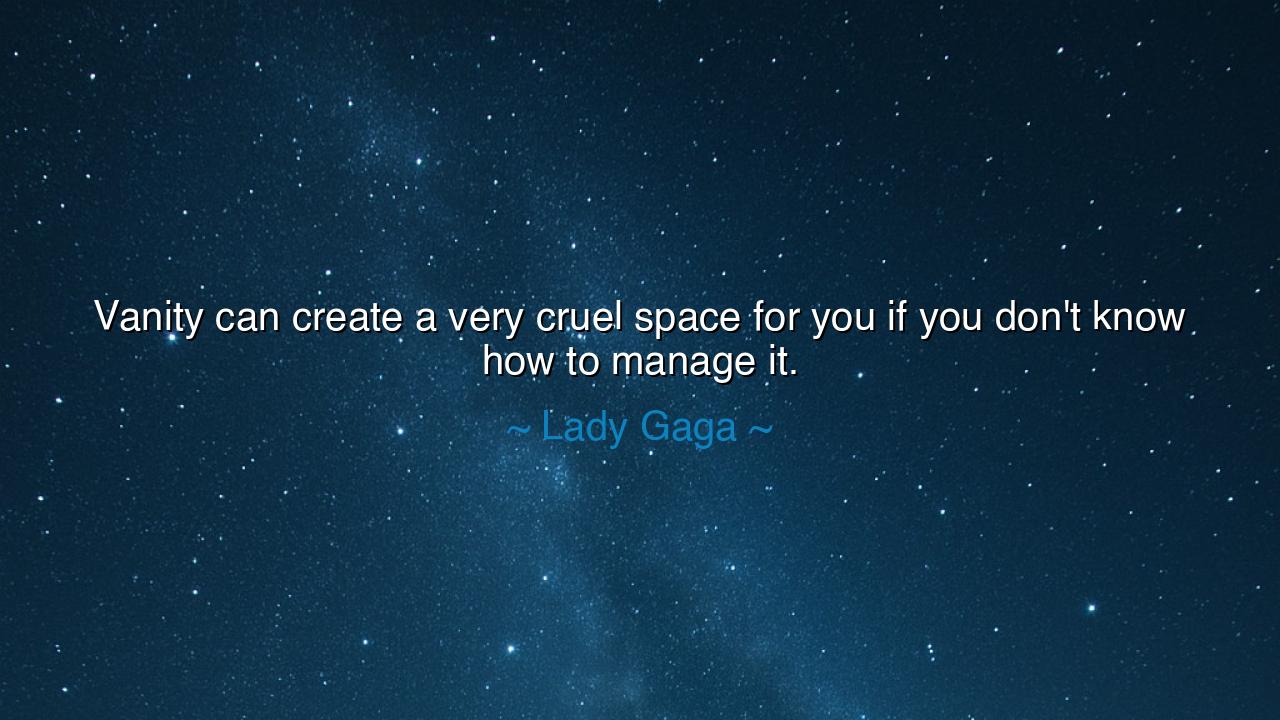
Vanity can create a very cruel space for you if you don't know






Host: The dim glow of the evening settled into the room, the last traces of sunlight slipping away as the night deepened. Jack sat at the table, his tea cooling in front of him, his fingers resting lightly on the edge of the cup. Jeeny stood near the window, her arms crossed loosely, gazing out at the street, absorbed in the words of Lady Gaga that Jack had just read. The quote felt like an invitation to explore the complexities of vanity, self-image, and the potential dangers of letting them define us.
Jeeny: “I’ve been thinking about what Lady Gaga said: ‘Vanity can create a very cruel space for you if you don’t know how to manage it.’ It’s such an interesting reflection, isn’t it? The way she talks about vanity as something that, if not handled properly, can consume you. It’s like she’s acknowledging that there’s a dark side to the pursuit of appearance, to the way we define our worth by external validation.”
Jack: “Exactly. Vanity, in itself, isn’t inherently bad—it’s the way we manage it, the way we approach it. When vanity becomes the primary force in our lives, when we place all our value in how we look, how others perceive us, it can become a trap. It’s like Lady Gaga is saying that vanity, unchecked, can create an environment where you're constantly seeking validation, and that pursuit can be incredibly destructive.”
Jeeny: “Yes, it’s like vanity can create a false sense of identity, one that’s based solely on external factors—appearance, success, status. But when those things are stripped away, or when they don’t live up to our expectations, we’re left with nothing but emptiness. Vanity can make us believe that if we aren’t perfect in the eyes of others, we’re not worthy. And that’s where it becomes cruel—it’s never enough, and we’re left feeling hollow.”
Host: The stillness in the room deepened as they both reflected on the weight of vanity and its potential to shape our sense of self in harmful ways. Jack’s gaze turned inward, as if contemplating the delicate balance between self-esteem and self-image. Jeeny’s eyes softened, a quiet understanding forming as she thought about the impact vanity can have on one’s inner world.
Jack: “It’s interesting because society often encourages us to be concerned with appearance, with success, with what others think. There’s an inherent pressure to perform in certain ways, to look a certain way, to measure up to an ideal. But in doing that, we risk losing sight of what’s truly important—our authenticity, our internal worth. Vanity can distract us from who we really are, and when we define ourselves by it, we lose touch with our true essence.”
Jeeny: “Yes, and that’s why it’s so important to manage vanity, to understand it in a healthy way. There’s nothing wrong with taking care of yourself or being proud of your accomplishments, but when vanity starts to define you—when you become obsessed with how others see you, or how you appear to the world—that’s when it becomes dangerous. It’s about finding balance, about valuing who you are beyond the surface.”
Jack: “So, Lady Gaga is reminding us that self-awareness is key. Vanity, like anything else, isn’t inherently bad, but it needs to be kept in check. It’s when we let it consume us, when we let it be the driving force behind our actions, that it becomes destructive. The key is not letting vanity take over, but instead, managing it in a way that allows us to stay grounded in our true self.”
Jeeny: “Exactly. When we can appreciate ourselves and our appearance, but not let it define our worth, we can live in a space of empowerment rather than fragility. Vanity, when managed properly, can be a tool for confidence. But when it’s unchecked, it can take us to a place where we’re constantly seeking validation and never feeling satisfied. It’s all about balance and awareness.”
Host: The room felt quieter now, the weight of their conversation settling into a shared understanding. Lady Gaga’s words had sparked a deeper reflection on how vanity can shape our lives—how it can empower or trap us, depending on how we manage it. The real lesson seemed to be in self-awareness, in recognizing when vanity is serving us and when it’s controlling us. The world outside had darkened, but inside, there was a lightness—a quiet recognition that true worth is not found in external validation, but in the balance between how we see ourselves and how we choose to engage with the world.






AAdministratorAdministrator
Welcome, honored guests. Please leave a comment, we will respond soon